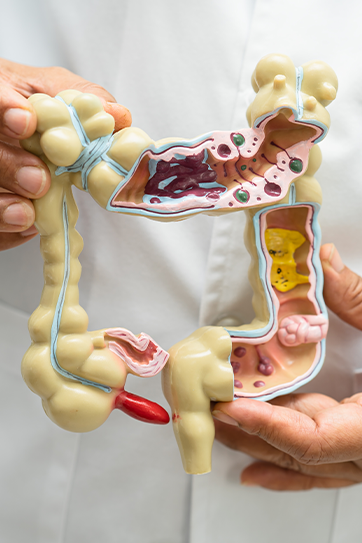Rectal cancer is a type of cancer that occurs in the rectum, the last 15 centimeters of the colon just above the anus.
It accounts for about 20 percent of colorectal cancers (cancers of the large intestine and rectum). Approximately 12.000 people are diagnosed with rectal cancer every year in Turkey. It is more common in men than women. The incidence increases with age and is more common in people over the age of 65. Colorectal cancers are the fourth leading cause of cancer deaths in Turkey.
Approximately 1.8 million people worldwide are diagnosed with rectal cancer each year. It is more common in developed countries than in developing countries. Rectal cancer ranks sixth in cancer deaths worldwide.
Rectal cancer is a type of cancer that develops in the last part of the large intestine called the rectum. Symptoms usually occur in the advanced stages of the disease. The most common symptoms of rectal cancer are listed below:
Symptoms of rectal cancer often appear in advanced stages, so it is important to have regular health checks for early detection and to see a health professional when symptoms appear. When uncomfortable symptoms are noticed, consulting a doctor immediately can help detect cancer in the early stages and increase the chances of treatment.
Rectal cancer is a condition that usually occurs as a result of a combination of certain factors. These factors include genetic and environmental factors. Here are the main factors that can cause rectal cancer:
Cancer of the rectum is usually caused by a combination of these factors. However, there is no rule that a person exposed to these risk factors will necessarily develop rectal cancer. Regular health check-ups, early detection, and lifestyle changes can play an important role in reducing the risk of rectal cancer. If there are any concerns, it is important to talk to a health professional.
Diagnosis of rectal cancer is done using various medical tests and imaging methods. These methods help determine the type, stage and treatment options of cancer. Here are the main methods used in the diagnosis of rectal cancer:
Diagnosis of rectal cancer usually involves a combination and a treatment plan is created based on the results of these tests. Early diagnosis can help to treat the cancer more effectively and improve health outcomes. In case of any suspicious symptoms, it is important to contact a health professional.
The methods used in the treatment of rectal cancer vary according to the general health status of the patient, the stage of cancer, and the location of the tumor in the rectum. The most commonly used method in the treatment of rectal cancer is surgery. During surgery, the tumourous tissue and some healthy tissues around it are also removed. Rectal cancer surgery can be performed in two ways:
It should not be forgotten that the success rate of rectal cancer treatment depends on the patient's general health status, the stage of cancer and the location of the tumor in the rectum. Early detection and treatment significantly increase the survival rate of rectal cancer. Contact Medwide for more information.




Get practical information about the topics you are most curious about. Everything you need to make informed decisions on your beauty and health journey is here with all the details from A to Z.
Hemorrhoids are not a factor that causes rectal cancer. Hemorrhoids are a condition that occurs as a result of dilation and swelling of the veins around the anus. Rectal cancer is a type of cancer that usually develops due to different causes such as genetic factors, age, intestinal polyps, and inflammatory bowel diseases. There is no direct causal relationship between the two conditions.
Rectal cancer and colon cancer (colorectal cancer) are two different types of cancer that generally affect the intestinal system but occur in different areas. The main difference is where the cancer develops.
Cancer of the rectum is not contagious from person to person. The cancer is usually the result of genetic changes at the cellular level and often develops due to factors such as environmental factors or genetic predisposition. Cancer of the rectum is not a disease that is transmitted from one person to another through contact or the air. Cancer is a condition caused by the uncontrolled growth and division of cells within the body.
Medwide meticulously arranges airport transfers for patients and their companions, ensuring their comfort and satisfaction.
Medwide's VIP transfer service offers patients a personalized and privileged travel experience, providing exceptional service.
Medwide transports patients and their companions comfortably and luxuriously, making their journeys enjoyable and relaxing.
Medwide offers quality healthcare services to patients at affordable prices, ensuring transparency and fairness in costs.
Medwide provides fast treatments by reducing patient wait times, our expert doctors promptly respond to our patients' needs.